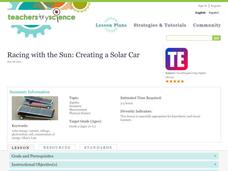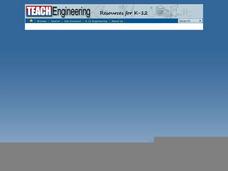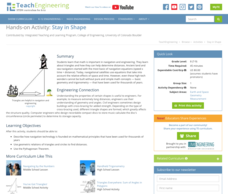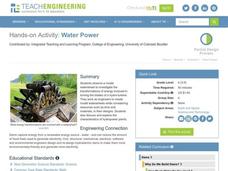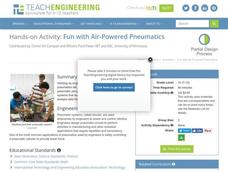Curated OER
Forces and Graphing
Middle schoolers analyze graphs to determine relationships between variables and rates of change. They determine the basic concepts about static reaction forces. They determine the slope and equation of a line.
Curated OER
An Arm and A Leg
Students examine how the movements of bones are dependent on the interaction of pairs of muscles. They design and construct a prototype of an artificial limb using a syringe system, and determine whether water or air makes the appendage...
Teach Engineering
Statistical Analysis of Flexible Circuits
Scholars connect statistical analysis with flexible electric circuits. They first learn about flexible circuits and their applications through a PowerPoint presentation and then consider how the fabrication process for these circuits...
Teach Engineering
Capturing the Sun's Warmth
Passive solar heating is a technology that's been in use for thousands of years. Here, elementary schoolers are exposed to this type of heating, the materials that are used in passive solar heating, and they study how engineers design...
Teach Engineering
Racing With the Sun - Creating a Solar Car
Here's an exciting and innovative instructional activity that's sure to get your charges fired up! In it, they use engineering design principles to construct and test a fully solar powered car. One caveat: the kits that each group needs...
Teach Engineering
Both Fields at Once?
An MRI uses both a magnetic and electricity, so how do the two interact with each other? Class members observe the effects on a charged particle when it is subject to both an electrical and magnetic field. The teacher background...
Teach Engineering
Measuring Surface Tension
How do you measure surface tension? The fifth installment of a nine-part series is an experiment where young scientists use tubes of different sizes to measure surface tension. They calculate the average and standard deviation of the...
Teach Engineering
Restriction Enzymes and DNA Fingerprinting
Show your class why restrictions aren't always a bad thing. In the third segment of a four-part series, the instructor develops the idea of restriction enzymes. Pupils learn how scientists use restriction enzymes in DNA analysis and DNA...
Teach Engineering
Acoustic Mirrors
Investigate sound waves with acoustic mirrors. Using audio software, groups make recordings of musical instruments, both with and without acoustic mirrors. They compare the recordings to see the effect of acoustic mirrors on sound...
Teach Engineering
Chair Design
Can you design the perfect chair? Scholars apply the engineering design process to design and build a prototype of a new type of chair from wires. They test their designs with a wooden artist model or stuffed animal.
Teach Engineering
May the Force Be with You: Weight
Too much material will weigh you down. The sixth segment in a series of 22 highlights how weight affects a plane. Pupils learn that engineers take the properties of materials, including weight, when designing something.
Teach Engineering
Six Minutes of Terror
Help your class understand the design challenges when trying to land a remote spacecraft on a planet. Class members examine the provided information to understand how each component of a spacecraft is designed in order to safely land a...
Teach Engineering
Airplanes Everywhere: Land! Water! Sky! Oh, My!
How important is aviation? Using the background information, teachers provide the class with a brief history of aviation. The class discusses how airplanes are important to the area of transportation in the 17th installment of a...
Teach Engineering
May the Force Be With You: Drag
Do not let friction drag you down! The 11th segment in a series of 22 focuses on the fourth force acting upon an airplane—drag. Pupils learn about the effects and causes of drag.
Teach Engineering
Manned Mission to Mars
To go or to not to go — the question for a mission to Mars. This resource provides details for a possible manned mission to Mars. Details include a launch schedule, what life would be like on the surface, and how the astronauts would...
Teach Engineering
May the Force Be With You: Thrust
Force the plane through the air. The lesson introduces the force on an airplane that makes it go forward. Pupils learn how Newton's laws of motion apply to flight in the eighth segment of a 22-part unit on flight.
Teach Engineering
Red Rover Robotics
Help your class understand the importance of exploration using robots. with a resource that provides a short history of robotics as a lead into looking at Martian robotic exploration missions. The activity specifically looks at the...
Teach Engineering
Stay in Shape
Using their knowledge of right triangles, pupils find out how far a ship is from a light house. Class members determine how far around the world a ship would be sailing at a constant speed.
Teach Engineering
Windy Tunnel
Lift—it is about the wing's attack. Using a virtual wind tunnel, pupils investigate wing shape and angle of attack. Learners use worksheets to record their observations and to convert verbal relationships into mathematical equations in...
Teach Engineering
Solar Power
How much solar energy is available at my location? An engaging resource provides a presentation along with script to give the class background information on determining solar radiation. Pupils then work through a worksheet to...
Teach Engineering
Water Power
Young hydrologists observe a waterwheel which helps them investigate the transformations of energy that occur when the blades of a hydro-turbine are turning. They work together in pairs and pretend to be engineers who are building a new...
Teach Engineering
Fun with Air-Powered Pneumatics
How high did the ball go? Engineering teams build a working pneumatic system that launches a ball into the air. The teams vary the amount of pressure and determine the accompanying height of the ball. An extension of building a device to...
Teach Engineering
Protecting Our City with Levees
Teams use the design process to design, build, and test a model levee to protect the town from a wall of water. A handout provides a price list for the materials learners can use to build their levee within a budget.
Teach Engineering
The Grand Challenge
Magnetic resonance imaging, just how safe is it? The introduction to unit study of magnetic resonance imaging technology presents the grand challenge questions of how an MRI machine works, the risks involved, the physics involved,...




